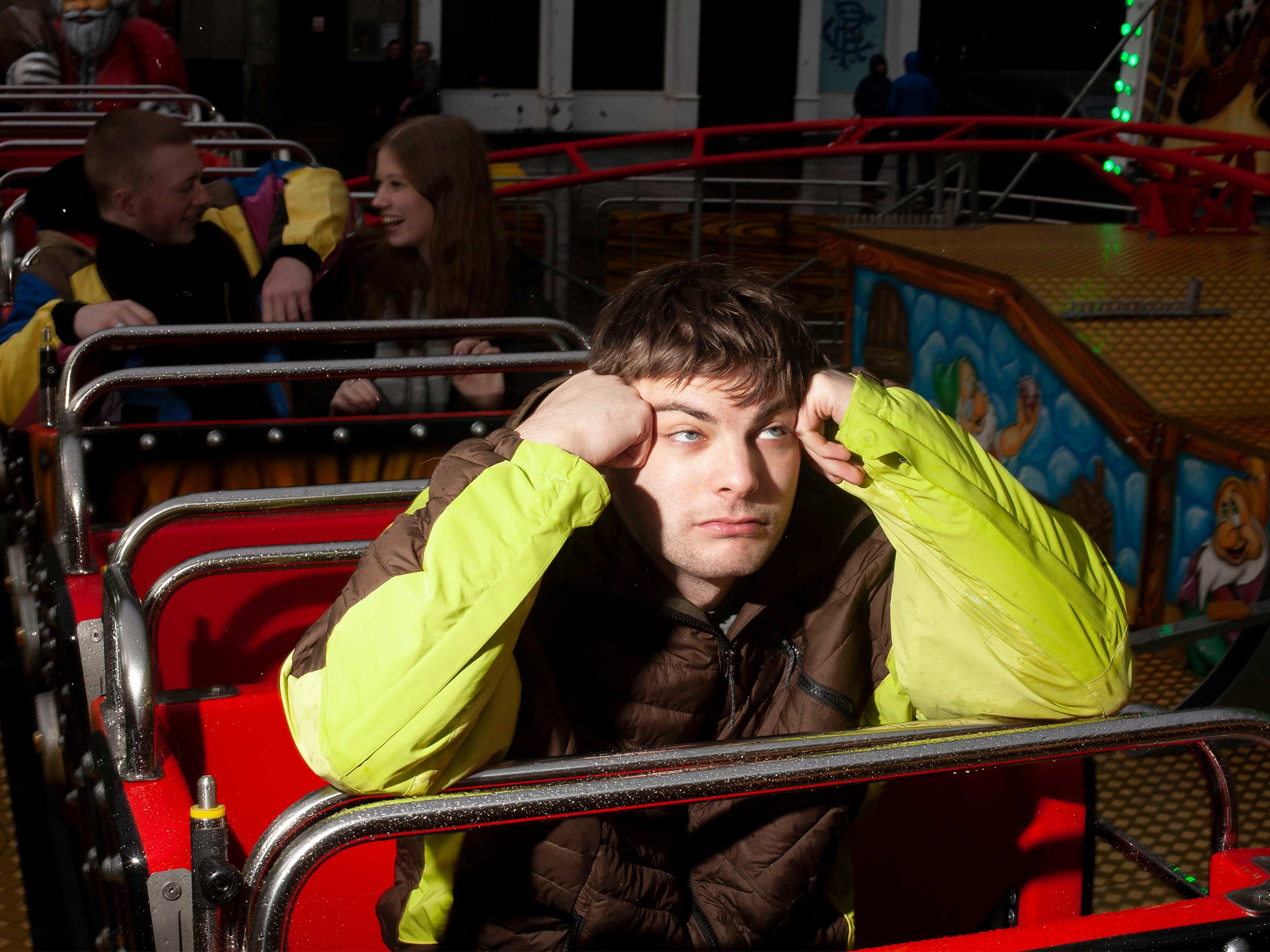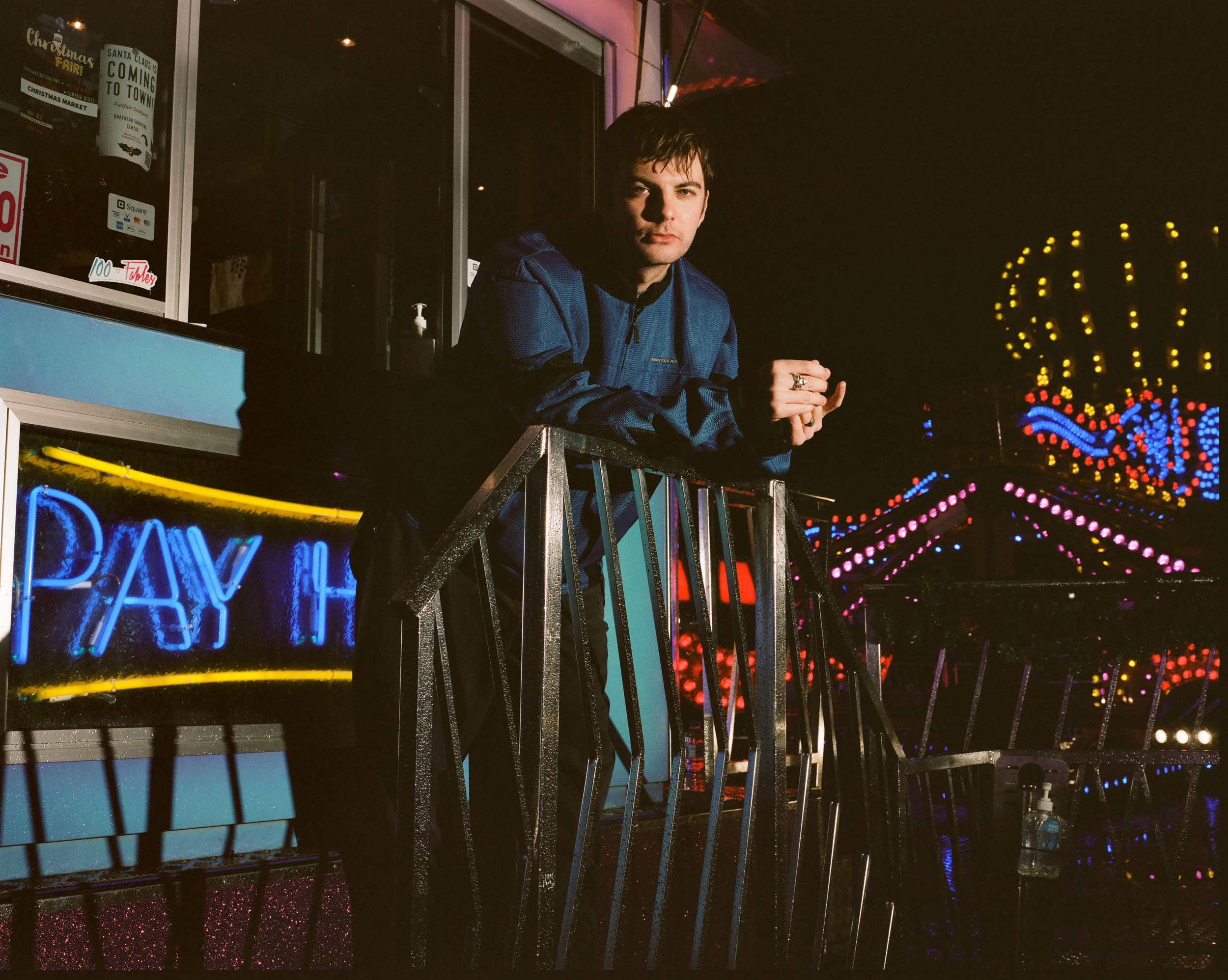Ahead of the release his latest album, Grian Chatten joins Document to dissect its anatomy and offer an analysis of the mercurial emotions that made it
The fly is most often understood as an emblem of death, of decay. But it also represents transformation and metamorphosis and change (whereby death and decay are instrumental stones for stepping). The fly is less romantic than its symbolic sisters—the butterfly, the phoenix, the leaves, the flowers, and so on—but change is habitually unromantic. It can require the fly’s ugly persistence, its circuitous path, its violent efforts. The road to something new is usually more akin to repeatedly smacking into a pane of glass before finding a window than it is to the soft, well-nurtured unfolding of a flower in bloom.
Grian Chatten hasn’t said so, but his album’s title and emotionally-tumultuous lyrics imply that the fly is an apt stand-in for his current state of being. Chaos For The Fly is a picture of irresolution. Written (in part) in the immediate aftermath of Fontaines D.C.’s Skinty Fia, the debut solo effort sees the Dublin-born artist in flux. Its songs are underpinned by disparate states of being, which is really the point of it all: They’re connected by their confusion—emblematic of psychological peaks that feel never-ending, before they drop into equally pseudo-inescapable emotional ravines. Each track is an act of indulgence, immortalizing the perceived permanence of a passing moment.
The record’s final track, “Season For Pain,” maybe best embodies that tempestuousness: moving from delicate and watery guitars to strange, gray intervals; taking on both full-bodied singing in earnest and fuzzy recordings of spoken word; oscillating between the literal and the metaphoric, between low and sweet notes; rendering those themes of back-and-forth explicit in its lyrics (“The shore was good while it ran my friend / ’Til it was running away / That was the season for loving / This is the season for pain”). The song is an illustration of unease, and choosing to end on it blackens Chatten’s ink of intention: Chaos For The Fly isn’t any sort of definitive statement—it asks more questions than it answers. On the whole, it’s evidence of his uncertainty, an attempt to make meaning of the indefinable in-betweens.
Ahead of the June 30 release of the record, Chatten joins Document to dissect the album’s anatomy and offer an analysis of the mercurial emotions that made it.
Megan Hullander: It seems that songwriting can be poetry, but not every song is necessarily a poem in its own right. I wonder, for you, where the differences between the two lie, and where you find overlap between them?
Grian Chatten: I think, outwardly, the differences are just the musical elements. But inwardly, I like to keep the differences as blurred as possible. I don’t really consider the application of the words that I’m writing—other than the fact that it serves as a function to myself, and to my own experience of life. Where they go after that is not as important to me. I’m kind of just writing all the time, and deciding afterward if it’s poetry, or if it’s music.
Megan: Does that serve a role in your vocal delivery—maybe the sort of hybrid talk-singing is an effort to find that space between song and poem?
Grian: I think that was really just inspired by the fact that I’m a very limited singer. There are all these notes in between—microtonal notes—and a lot of my favorite artists play on them. John Lennon did it all of the time. There’s a kind of musical theater element to it that I really enjoy, even though I’m not a classical musical theater fan.
“I think that often, events in my life are just kind of things that are going on around me. I’m a little bit beguiled by them, and shut off. Writing about them allows me to understand them and feel them.”
Megan: That theatricality sort of speaks to an indulgence in emotions, and there doesn’t seem to be any one feeling you lean into across the record. I wonder if there was an emotional narrative you were trying to construct in the organization of the songs.
Grian: Well, the temptation is to say yes, and I think that will inevitably exist: a natural thread, just by virtue of the fact that it’s a debut solo effort, coming from one person, distilled through one brain. I think I’ve basically wrote Skinty Fia, and I think that if I listed out the songs that I wrote [for Chaos For The Fly] before that, and the ones I wrote after that, it would make sense. The ones that I wrote after are quite depressive, and the ones that I wrote before are more hopeful and cinematic.
Some of them were written on tour—in a hotel room or on a bus. ‘All of the People’ was written on tour. And it’s quite indulgent. I wrote some of [the songs] in Dublin on the coast, around those quiet, gray beaches. A lot of it was kind of inspired by the cinematic quality of that town. It felt a bit like a set. And then, I mean, I grew up there, so there’s a lot of elements that I wanted to capture, in the sense that they caused me pain—not even necessarily in a negative sense, they just sit in me a bit. I think that was kind of what made me want to write about it: a rusty bobbing boat on the docks and its clanging sound, the [feeling of being] overly grateful for five minutes of sun, seagulls, the same three bars at a casino. I just wanted to make sense of it all.
I suppose I struggle to allow myself to feel things sometimes, and I think writing has been a way of opening myself up so I can experience things. If I go to an interesting town that I’m supposed to love, I don’t really experience it until I go a second time, and the pressure to experience it is gone. I think that often, events in my life are just kind of things that are going on around me. I’m a little bit beguiled by them, and shut off. Writing about them allows me to understand them and feel them.
Megan: Do you feel detached from the person you were when you wrote them?
Grian: Some of them. On a Monday, I relate to the first half, and on a Tuesday I relate to the second half. For example, the song ‘All of the People,’ I’m a bit repulsed by it, because I’m not really allowed to moan. And it’s a big fucking moan. I have to sort of flagellate myself for that one.
When you’re a kid, you can just kind of decide that your eyes are flowers or something like that; you can just make an arbitrary decision about reality. I feel like I’m granted that power again when I’m in the throes of creativity. And [writing] allows me to access the things that were happening at the time that I maybe wasn’t present enough to feel when they were happening. Even songs I wrote last year allowed me to feel great nostalgia. I suppose it is a bit of a logbook. I don’t know, I’m still very much glued to the process. I think what’s probably going to happen is I’ll have a serious creative drought at some point in my life, and then I’ll have all the answers about this kind of thing.
Megan: Does touring feed into that sort of drought? As it eats up more of your time spent just living, where do you find inspiration for writing?
Grian: I have been aware that I’m scraping the bottom of the barrel in terms of inspiration, a couple of times. It’s a terrifying feeling. And it’s probably just the kind of self-care thing going on, allowing yourself to assimilate back into your friend groups and stuff. I mean, as much of an isolating experience it can be, tour also animates those moments where life feels normal. I don’t just miss my friends; I miss taking them for granted. I don’t do that anymore, which is probably a good thing.
“When you’re a kid, you can just kind of decide that your eyes are flowers or something like that; you can just make an arbitrary decision about reality. I feel like I’m granted that power again when I’m in the throes of creativity.”
Megan: Do you feel like you’ve been able to find a sense of home in London?
Grian: I don’t know. I just moved back to Camden about a month ago. I tried to live on the south coast of England, near Hastings. But the silence is a bit too loud for me. And it’s very easy to live here now. I’ve adjusted to the noise and distraction.
Megan: It’s funny that you are more drawn to the noise and distraction than the quiet, when it feels like a lot of what you’re trying to get away from with touring would be exactly that.
Grian: I think it’s just being institutionalized a bit. When I was 16, 17, 18, I was incredibly comfortable on my own. I suppose I maybe felt a little bit more independent. And years of touring, living in other people’s pockets, and on other people’s itineraries, changed me. When I tried to live in that remote seaside town, it was terrifying. It’s pathetic.
Megan: Do you feel pressure to lean into those feelings, into the idea that great art is made from suffering?
Grian: I’m certainly guilty of having used it. I’ve thought for a very long time, so I haven’t really reappraised my own stance on this issue for a while. I’ve relied on this idea that suffering at least gives way to an appreciation of a lack of suffering. I’ve kind of been banking on that for a while. It’s been my justification for indulging in it. I don’t want to be 40 and have that [still] be my practice. You hear it all the time with artists who are no longer suffering, and are 50 or whatever, and feel like they’re at their creative peak. It’s something I’d love for myself. Because I’d be a pain to be around… I sound like a depressed person—how are you?





















